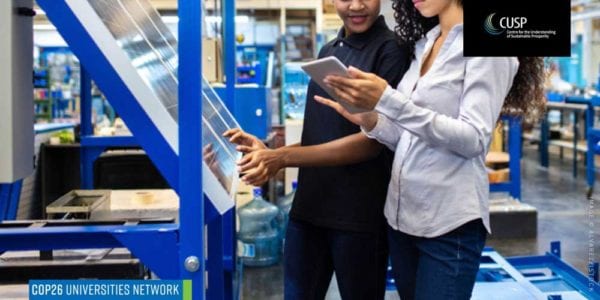Upskilling the UK Workforce for the 21st Century
Policy Briefing
Aldersgate Group | October 2020

In this latest briefing with CUSP, Upskilling the UK workforce for the 21st century, the Aldersgate Group calls for urgent action to plug the deficit in skills that currently undermines low carbon supply chains across the UK economy. The Group calls in particular for a new low carbon skills strategy that embeds sustainability across the national curriculum and teacher training standards, supports higher and further education institutions to better meet the needs of local employers and updates apprenticeship standards and mid-career reskilling qualifications to equip the workforce with the skills needed in a net zero emissions economy.
The UK economy has long faced significant challenges in terms of skill shortages and regional inequalities, with some 91% of businesses recently saying they face a skills deficit and the economies of Yorkshire and the Humber, the North East, and the West Midlands growing at less than half the rate of London’s economy between 1998 and 2016. The COVID-19 crisis has amplified these challenges and brought with it a huge increase in unemployment and in particular, youth unemployment. Against this backdrop but also recognising the significant job creation potential provided by the transition to a net zero emissions economy, the paper argues that low carbon skills provision must become a national policy priority.
Building on the Government’s recent announcement to expand post-18 education and training, the Group calls for a comprehensive low carbon skills strategy based on five key recommendations:
1. Environmental sustainability and the net zero goal should be fully embedded in the national curriculum across all stages of the education system from primary to tertiary education. This should include a requirement on Further and Higher Education Institutions to put in place skills’ action plans to ensure students are provided with the right practical skills when they leave and to address the lack of gender and ethnic diversity in STEM subjects that will be increasingly key in a net zero emissions economy;
2. This focus on sustainability should be fully reflected in teaching qualifications and the governance of the education system. With 75% of teachers saying they haven’t received adequate training to educate students about climate change, the Aldersgate Group calls for teaching standards and the Initial Teacher Training Content Framework to be updated to equip teachers with the right knowledge. The briefing also argues that regulatory bodies such as Ofsted should be required to place greater emphasis on quality of sustainability teaching as part of their assessment of schools and other educational institutions.
3. Higher Education and Further Education Institutions should be supported and encouraged to tailor courses, training and qualifications that more closely match the needs of local employers and low carbon job creation. The employer-led STEM education and training curriculum put in place by the Newcastle College Energy Academy, which is training future engineers and technicians in the renewable energy sector, provides a good example in this regard.
4. Funding, research and development support, and business partnerships need to be increasingly targeted to educational institutions that are not located in the ‘Golden Triangle’ between Oxford, Cambridge and London and which have received less support to date. This is essential to ensure that education institutions across the country are well equipped to provide the low carbon skills required in their area. Businesses in the offshore wind sector which have regularly supported local University Technical Colleges and universities in the areas they operate provide a good precedent for other businesses to follow.
5. To have an effective net zero education system, the UK needs to reform its approach to apprenticeship standards and mid-career reskilling. Apprenticeship standards should require and incentivise businesses to provide their apprentices with core low carbon skills that go beyond a business’ immediate and short-term priorities. Recognising the complexities of mid-career reskilling, government policy should support Higher Education Institutions to develop new, short-term training and qualifications on low carbon skills to make it easier for those already on the job market to transition towards employment opportunities in a net zero emissions economy.
Beyond putting in place a comprehensive low carbon skills strategy, the Aldersgate Group calls for progress in two complementary areas that are essential to grow low carbon supply chains:
6. Building on recent policy announcements in areas such as in offshore wind, the Government should progress work to put in place a comprehensive policy plan that will put the UK on a credible pathway towards its net zero target [5]. A clear suite of policies will be essential to grow demand in low carbon infrastructure, goods and services, with positive knock on impact on job creation and demand for low carbon skills. This should include rapid regulatory and fiscal policy decisions to grow private investment in ‘low-regret’ areas such as buildings, surface transport, power and waste. It should also include an accelerated innovation programme to trial critical technologies to cut emissions in more complex parts of the economy such as heavy industry, agriculture and long-distance transport.
7. Local bodies must be better empowered to support low carbon investment, job creation and skills provision in their areas given that they are often better placed to understand local needs. Building on the Cities and Local Government Devolution Act 2016, local bodies should be provided with greater policy autonomy as well as multi-year funding to support investment in critical local projects such as low carbon transport and energy infrastructure. Creating a National Investment Bank – with a mandate to grow low carbon investments in regions most in need of economic regeneration – and setting up a National Skills Commission to co-ordinate the development of the UK’s skill strategy between national government, businesses and local bodies could play a key role in growing low carbon supply chains and skills across the country.
The paper is available for download in pdf via the Aldersgate Group website. If you have difficulties accessing the paper, please get in touch: info@cusp.ac.uk.



